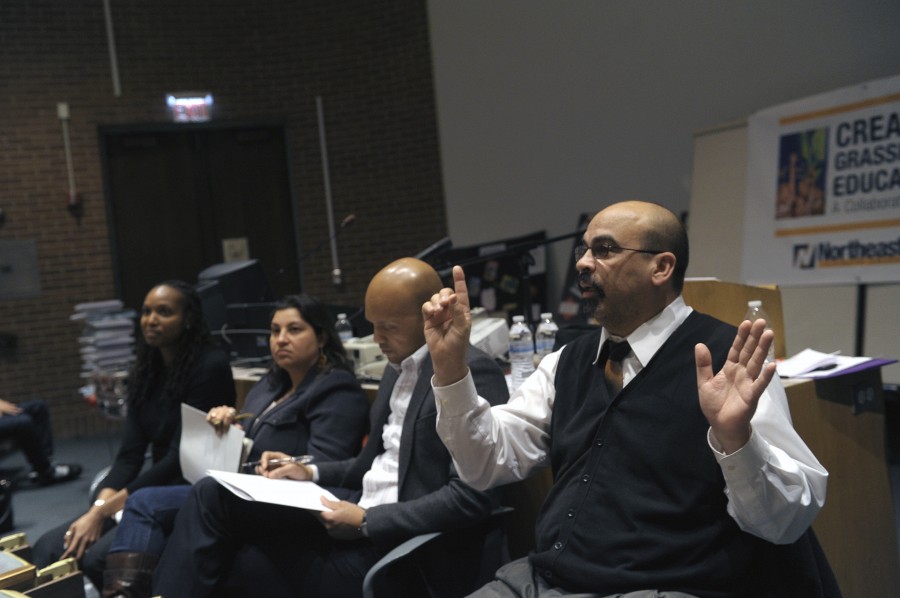Creating Grassroots Education at NEIU
April 23, 2013
NEIU’s hosted its 3rd Annual Creating Grassroots Education: A Collaborative Forum for those in pre-service education, practicing teachers, administrators, counselors and anyone else involved or concerned with the importance of preparing youth for their future by informing them on social justice issues and implementing curriculum that lends itself to individual empowerment, community involvement and worldly concerns.
Educators and administrators from high schools and universities throughout Chicago shared their thoughts on the state of education, changes to policy and ideology.
The event was inspired by The Chicago Grassroots Curriculum Taskforce (CGCT). CGCT is a community of educators and concerned educational activists that are part of “a growing body [that] recognizes that a crisis of curricular irrelevance exists, especially concerning students’ own communities, histories, cultures, and real world realities.” They seek to promote curriculum that is culturally relevant and that connects students to their environment. CGCT recognizes that “many students are unmotivated, underserved, and miseducated by most mainstream textbooks, standardized tests, and scripted curricula,” according to their website.
David Stovall, Associate Professor of Educational Policy Studies and African-American Studies at the University of Illinois at Chicago (UIC) emphasized that CGCT is concerned with ensuring that young people “make conscious, relevant, and informed decisions about their lives,” Stovall said.
“We’re trying to imagine a different way a school can be,” said Alejandra Frausto, who coordinates curriculum development at Lozano High School where letter grades and grade-level titles have been replaced.
Kevin Kumashiro, Professor of Asian American Studies and Education at UIC, believes that in order to teach successfully, teachers and administrators need to examine the “lens” through which they have molded their educational beliefs/values. Kumashiro asked attendees to “question conventional wisdom” and try to erase the same educational notions of common sense that have historically prevented particular groups of Americans from receiving proper education, according to Kumashiro.
Within the last 50 years, according to Kumashiro, common sense prevented women from getting an equal opportunity to education, owing to the notion that it caused infertility. And just half of a century ago, the idea that “negroes shouldn’t learn” was another prevailing misconception. Erica Meiners, NEIU Professor and a teacher at St. Leonard’s Adult High School, an alternative high school for men and women who have been incarcerated, offered a common misconception that may still be around today- that “students who ask questions are deemed bad students.” These notions are just some issues that motivate educators and activists to continue providing ideas on adding relevancy to education. “Public education has always been a struggle,” Kumashiro said. “We need to create a stronger movement to improve [it].”
Anton Miglietta, director of CGCT taught in the Chicago Public School (CPS) system for 10 years is guided by the motto, “Students don’t fail. We fail as a teacher if they fall behind.” This quote from Dorothy Strong drives Miglietta’s philosophy of teaching which involves “tough love,” activities based on students’ interests and student empowerment, and educational ownership through community awareness and involvement.
“Create awesome activities where they can apply their learning and skills,” Miglietta said. The CGCT director promotes thematic, project-based units relevant to “real conditions that students face.” He encourages teachers to question everything they are doing to see if their methods will help students “build knowledge of self.”
“Students don’t have a dysfunctional relationship with learning- they have a dysfunctional relationship with school.” Miglietta encourages teachers to create “amazing, powerful, intelligent, creative, trustworthy and committed students.”
The panel of teachers agreed that teaching methods are not only dynamic and changing depending on the state of the world, but communities vary even in one city. “We also have to be flexible ourselves,” Meiners said. “Educational approach is constantly changing,” Stovall said. “We have to be able to shift.”
“You have to conform to relevant education and make it make sense for your students so they can actually apply these skills in real life,” NEIU History and Secondary Education Major Wojciech Warias said. Warias attended the event to assist him in his education courses. Warias was moved by a panel member’s emphasis on honesty with students. “I loved hearing that they mentioned how it’s alright to apologize to your students if you had a bad lesson or lecture,” Warias said.
Cathleen Schandelmeier-Bartels, a recent alumna of NEIU with a degree in Secondary Education, Language Arts believes in social justice and feels “that its inclusion in the classroom is essential for a more peaceful, verdant world,” Schandelmeier-Bartels said. “For me, the most beneficial aspect of this event was the opportunity to discover new teaching techniques that incorporate social justice into the classroom. I also appreciated the chance to network with teaching professionals and administrators.”
Urban Renewal or Urban Removal? A Grassroots Look at Chicago Land Grabs and the Struggle for Home and Community is CGCT’s first of eight curriculum books financed by donations supporting the grassroots cause. The book, designed for 8th grade classrooms through to college, covers many disciplines from U.S History, Language Arts, Mathematics, and more. An additional journal can be purchased which contains dozens of worksheets that accompany lesson plans introduced by the former text (and a free mixed conscious hip hop CD).
The event was organized by NEIU Professors Ann Aviles de Bradley, Gabriel Cortez, Isaura Pulido, NEIU graduate Mildred Salguero, and former educator and currently Director of CGCT Anton Miglietta. For more information on this text as well as on contributing to future textbooks, visit http://www.grassrootscurriculum.org/.









